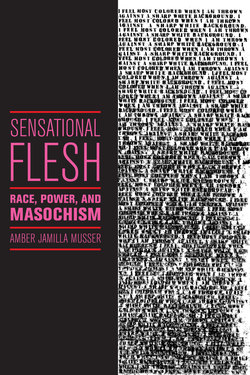Читать книгу Sensational Flesh - Amber Jamilla Musser - Страница 7
На сайте Литреса книга снята с продажи.
ОглавлениеAcknowledgments
this book has had many incarnations and benefited from input of many kinds, from many people along the way. It began as a stubbornly fascinating idea that I discussed over many cups of tea with my fellow polymorphous perverts—Stephanie Clare, Niamh Duggan, Joanna Cupano Bowling, Marcie Bianco, and Irene Revell—on High Street in Oxford. It then grew into a dissertation completed in the History of Science Department at Harvard University under the guidance of Anne Harrington, Afsaneh Najmabadi, Katy Park, and Marwa Elshakry. Alongside these excellent readers and kind mentors, I found colleagues in the program for women, gender, and sexuality studies and was able to make this not-quite history of science project my own. Thanks also to Margot Minardi and Laura Murphy, who were willing to listen to my theory babble. However, the project truly gained flesh during my three wonderful years at New York University’s Draper Program. Within this luminous community, I was blessed with excellent students and wonderful colleagues—John Andrews, Rebecca Colesworthy, Robert Dimit Nina Hien, Larissa Kyzer, Georgia Lowe, Theresa Macphail, Steve Moga, Robin Nagle, Ann Pellegrini, and Maia Ramnath—who offered cocktails, invaluable feedback, and friendship. Ultimately, the book was completed thanks to a generous fellowship at the Pembroke Center at Brown University. I thank my colleagues, most especially Meredith Bak, Timothy Bewes, Fannie Bialek, Nadine Boljkovac, Michelle Cho, and Debbie Weinstein for stimulating conversation and help in reorienting my thoughts on perception. Special Thanks to Washington University in St. Louis and the Program for Women, Gender, and Sexuality Studies for their intellectual and financial generosity in this project’s final stages.
Throughout these years, I have also been incredibly fortunate to call Stephanie Clare, Jennifer Nash, and Nasser Zakariya dear friends. They tirelessly read multiple drafts, provided encouragement and advice, asked hard questions, and surrounded me with an abundance of care and support. I also owe a large debt of gratitude to Ankur Ghosh, Emily Bolton, Danny Fox, Larissa Chernock, Ann Weissman, Joseph Cooper, Chitra Ramalingam, and Isaac Nakhimovksy, who are closer to family than friends. I am grateful to them for meeting my angst with adventure, laughter, sharp wit, intellect, and generosity.
I owe the largest debt of gratitude to my family, who have consistently provided me with love, support, and imagination. They have taught me that life shouldn’t be taken too seriously and that celebration and gratitude are the nectar of life. Much love to Camille, John, and Thomas Musser.
NYU Press has been excellent to work with. I thank Ciara McLaughlin, Alicia Nadkarni, Tim Roberts, and Eric Zinner for their work in making all of this come to fruition. I especially thank Eric for his insight into the real stakes of this book, which were buried somewhere between words 1 and 80,000. Darieck Scott’s and an anonymous reviewer’s keen readings helped the manuscript gain its wings. I have also benefited enormously from Ann Pellegrini’s and José Muñoz’s incisive feedback, gentle shepherding of the project, and generous invitation to be part of the Sexual Cultures series. José even came up with the title this book. It is strange and sad to be writing these acknowledgments in the wake of José’s untimely and unimaginable passing. I remain awestruck at their enormous generosity as scholars and friends.
Audiences at Occidental College, Bucknell University, Emory University, Brown University, Oxford University, and Washington University in St. Louis have provided thoughtful and helpful engagement with this project. Thanks to Sikkema Jenkins & Co and Kara Walker for permission to reproduce The End of Uncle Tom and the Grand Allegorical Tableau of Eva in Heaven. Thanks also to Luhring Augustine and Glenn Ligon for permission to reproduce Untitled (I Feel Most Colored When I Am Thrown against a Sharp White Background). Portions of chapters 2, 3, 4, and 5 were developed in earlier essays: “Anti-Oedipus, Kinship, and the Subject of Affect,” Social Text 30, no. 3 (2012): 77–95; “Reading, Writing, Masochism: The Arts of Becoming,” differences: A Journal of Feminist Cultural Studies 23, no. 1 (2012): 131–50; and “Reading, Writing, and the Whip,” Literature and Medicine 27, no. 2 (2009): 204–22.
